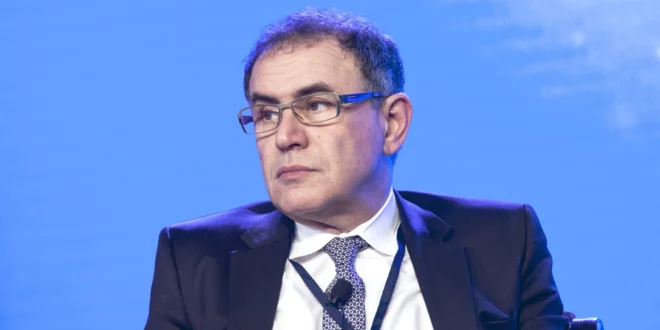“Severe megathreats are imperiling our future – not just our jobs, incomes, wealth, and the global economy, but also the relative peace, prosperity, and progress achieved over the past 75 years. The relatively “golden” period between 1945 and 1985 is over.”
Nouriel Roubini on Megathreats: “Now we are entering a new era that will more closely resemble the tumultuous and dark decades between 1914 and 1945,” writes Dr. Nouriel Roubini, professor emeritus of economics at New York State University Stern School of Business at Project Syndicate.
Roubini is the Chief Economist at Atlas Capital Team, CEO of Roubini Macro Associates, Co-Founder of TheBoomBust.com, and the author of MegaThreats: Ten Dangerous Trends That Imperil Our Future, and How to Survive Them.
Dr. Roubini calls this a geopolitical depression with four powers – China, Russia, Iran, and North Korea – challenging the unipolar world created by the United States after World War II.
He points to China, where President Xi Jinping is consolidating an authoritarian rule and the current U.S. – China trade war, tightened trade restrictions, “friend shoring” instead of “offshoring”. This all creates an environment in which the new Sino-American cold war is getting colder.
RELATED ARTICLE: Megathreats, deglobalization and the end of European greatness

Nouriel Roubini on Megathreats: The China zero-COVID policy slows down the Chinese economy, which results in a surge in demand for commodities that do not arrive at American and European shores, which again adds to the global inflationary pressure. The Taiwan issue and North Korea further complicates matters.
The growing risk of large-scale conventional wars, expanding from the Ukraine-Russia situation is a growing threat, Dr. Roubini points out that “we don’t yet know if World War III has already begun in Ukraine. That determination will be left to future historians – if there are any.”
As for the green-wave that has persistently dominated the public sphere for the last years, he calls it greenwishing:
“Even discounting the threat of nuclear Armageddon, the risk of an environmental Apocalypse is becoming increasingly serious, especially given that most of the talk about net-zero and ESG (environment, social, and governance) investing is just greenwashing – or greenwishing. The new greenflation is already in full swing, because it turns out that amassing the metals needed for the energy transition requires a lot of expensive energy.”
Next, the risk of new pandemics that “would be worse than biblical plagues.”
“In addition to the short-term factors, negative supply shocks and demand factors in the medium term will cause inflation to persist. On the supply side, I count eleven negative supply shocks that will reduce potential growth and increase the costs of production. Among these is the backlash against hyper-globalization, which has been gaining momentum and creating opportunities for populist, nativist, and protectionist politicians, and growing public anger over stark income and wealth inequalities, which is leading to more policies to support workers and the “left behind.” However well-intentioned, such measures will contribute to a dangerous wage-price spiral.”
Finally” “Now that the US dollar has been fully weaponized for strategic and national-security purposes, its position as the main global reserve currency could eventually begin to decline, and a weaker dollar would of course add to inflationary pressures in the US. More broadly, a frictionless world trading system requires a frictionless financial system.”
Nouriel Roubini on Megathreats: Read the full article here.
RELATED ARTICLES:
- Europe, the American Vassal: Europe imposes Sanctions on themselves, Forcing a Depression
- The American quest to weaken Europe and Russia: U.S. stated goal post-Cold War
- War in Europe U.S. Strategy Calls for Insuring No Rivals Develop, keep Europe weak
- Western sanctions may hurt the West and especially Europe much more than Russia
- Ukraine-Russia War: Europe may be the Economic Loser









